Read on to learn some interesting facts – I promise I won’t let it turn into a long, boring, history book!
The history of organic vegetable gardening dates back many centuries, as ancient civilizations relied on this (plus fishing or hunting) to put food on the table.
Back then, nobody used fertilizers and pesticides, but as the world increased in population, the demand for food also went up. To fill the gap, scientists discovered it was possible to introduce chemical fertilizers to cut the harvesting time, eliminate the need to let the land lie fallow to replenish itself, grow more in a smaller amount of space, and make the vegetables bigger.
 Image by cafemama via FlickrOrganic vegetable gardening made a comeback in the 1980’s, when the US department of Agriculture encouraged small farmers by giving them incentives. This made more farmers revert to this old method of farming, both in the US and Europe.
Image by cafemama via FlickrOrganic vegetable gardening made a comeback in the 1980’s, when the US department of Agriculture encouraged small farmers by giving them incentives. This made more farmers revert to this old method of farming, both in the US and Europe.But organic vegetable gardening is not just eliminating the use of fertilizers and pesticides. Farmers will have to use other means to make crop grows such as compost, crop residue, crop rotation, integrated pest management and mechanical cultivation in order to preserve soil productivity and combat pests.
The International Federation of Organic Agriculture Movements is the regulator these days that tells farmers across the globe how this should be done. Their recommendations help organic crops grow on 75 million acres of land across the globe.
Their strategy is focused on sustainable development so that the land used today can maintain a healthy ecosystem, and therefore may also be used by the next generation.
Organic vegetable gardening has proven to be as effective (or almost as effective) as conventional methods. For example, one study has pointed out that the amount of corn and soybeans produced using this method was almost the same compared to those who used chemical fertilizers and pesticides. The best part is that this was achieved without using as much energy and without the risk of leaving behind harmful chemicals to enter our bodies.
 It has been estimated by one university that if developing countries also practice good organic vegetable gardening techniques, they may be able to double or triple their crops without spending scarce resources on buying pesticides and fertilizers.
It has been estimated by one university that if developing countries also practice good organic vegetable gardening techniques, they may be able to double or triple their crops without spending scarce resources on buying pesticides and fertilizers.Because organic vegetable gardening is so easy, almost anyone can do it. The key to a successful harvest using organic farming is planning. You will need to make sure the land you are using has adequate sunlight and an efficient drainage system, as well as a method of irrigation.
If you are able to figure that out, the only thing you have to worry about is what to plant – which can be important, as some vegetables do not well under certain conditions, climates, or soil types. Those who know what they can and cannot plant will save themselves time and money so they can focus on what works.
The history of organic vegetable gardening has now come full circle as we are once again using methods that ancient civilizations practiced long before we were born. You can do your part by planting your own organic garden, or, if you are not able to garden, supporting your local organic farmers by purchasing your groceries at your local farmer’s market or though a CSA.
The end result is that you eat healthy without worrying so much about consuming chemicals that may be harmful to your body.
Related articles on Organic Gardening:
- Growing Organic Foods the Natural Way (rawlivingfoods.typepad.com)
- Planting a cover crop this fall will make spring gardening easier (seattletimes.nwsource.com)

No comments:
Post a Comment